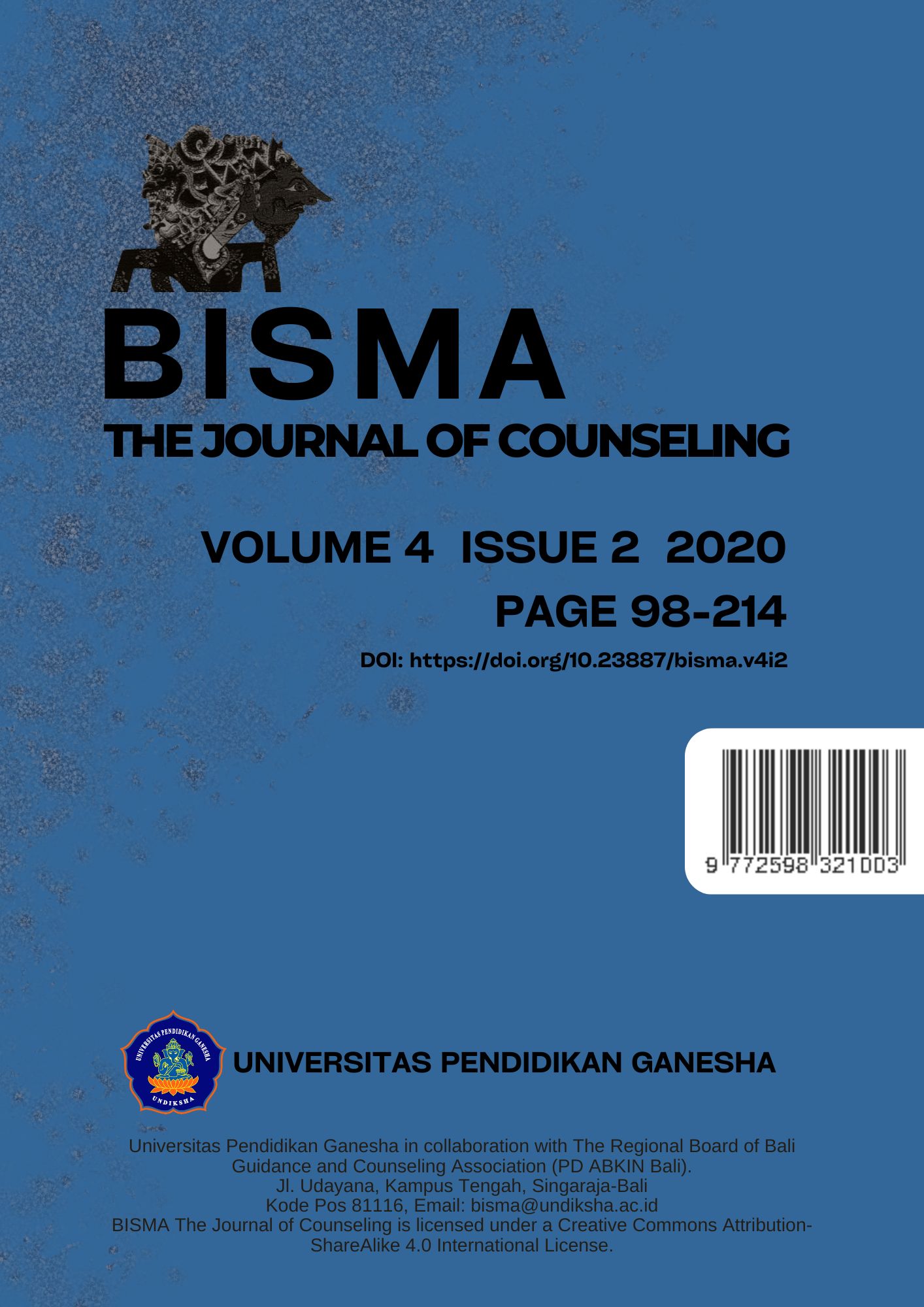Effectiveness of Cognitive Behavioral Group Counseling to Increase Self-Confident of Vocational High School Students
DOI:
https://doi.org/10.23887/bisma.v4i2.29788Keywords:
Guidance and Counseling, School Counselor, Students, SchoolAbstract
Low student self-confident will affect to the his/her development process in school. The purpose of this study is to determine the effectiveness of cognitive behavioral group counseling to increase self-confident of vocational high school students. The research design is one group pre-test – post-test design. The population is student’s X grade class at SMK Prshanti Nilayam Kuta. Determination of the sample using purposive sampling technique, in order to get 8 students as the sample. The data analysis using t-test. The results of this study showed that self-confident score was an increase after join in the group counseling activities. The results of hypothesis testing show that the value of t = 7,434 with a significance of 0.000 (<0.05) so that null hypothesis is rejected. These results indicate that group counseling with cognitive behavioral approach is effective to increase self-confident of vocational high school students.References
Apriliana, I. P. A., Suranata, K., & Dharsana, I. K. (2019). Mereduksi Kecemasan Siswa Melalui Konseling Cognitive Behavioral. Indonesian Journal of Educational Counseling, 3(1), 21-30.
Beaulieu, Diana Joyce & Sulkowski, Michael L. (2015). Cognitive Behavioral Therapy in K-12 School Settings, A Practitioner’s Toolkit. New York: Springer Publishing Company
Dantes. (2017). Desain Eksperimen dan Analisis Data. Depok: PT. Raja Grafindo Persada
Dantes. (2012). Metode Penelitian. Yogyakarta: CV Andi Offset
Eryanti, D. (2020). Keefektifan konseling kelompok ringkas berfokus solusi untuk meningkatkan percaya diri siswa Sekolah Menengah Pertama. SKRIPSI Mahasiswa UM.
Fahmi, N. N., & Slamet, S. (2016). Layanan Konseling Kelompok dalam Meningkatkan Rasa Percaya Diri Siswa SMK Negeri 1 Depok Sleman. Hisbah: Jurnal Bimbingan Konseling dan Dakwah Islam, 13(2), 69-84.
Fatchurahman, M. dan Pratikto, Herlan. (2012). Kepercayaan Diri, Kematangan Emosi, Pola Asuh Orang Tua Demokratis dan Kenakalan Remaja. Persona, Jurnal Psikologi Indonesia. Vol. 1 No. 2
Flanagan, John Sommers & Flanagan, Rita Sommers. (2015). Counseling and Psychotherapy Theories in Context and Practice. Skills, Strategies and Techniques. Second Edition. Canada: John Wiley & Sons, Inc.
Koyan, Wayan. 2012. Statistik Pendidikan, teknik analisis data kuantitatif. Singaraja: Universitas Pendidikan Ganesha Press
Lin, Y. N. (2002). The application of cognitive-behavioral therapy to counseling Chinese. American Journal of Psychotherapy, 56(1), 46-58.
Mahendra, I Kadek Ady, Dantes, I Nyoman, dan Lestari, Luh Putu. (2017). Perbedaan Efektivitas Model Konseling Gestalt Teknik Pembalikan dengan Teknik Permainan Dialog terhadap Percaya Diri Siswa kelas X SMA Negeri 1 Singaraja. (Skripsi Tidak diterbitkan) Jurusan Bimbingan Konseling, FIP Undiksha
Mastuti, I. (2008). Kiat Percaya Diri. Jakarta: Hi-Fest Publishing
Naar, Sylvie and Steven A. Safren. (2017). Motivational Interviewing and CB, Combining Strategies for Maximum Effectiveness. William R. Miller (Foreword). New York: The Guilford Press
Natawidjaja, Rochman. (2009). Konseling Kelompok, Konsep Dasar dan Pendekatan. Bandung: Rizqi Press
Oemarjoedi, Kasandra. (2003). Pendekatan Cognitive Behavior dalam Psikoterapi. Jakarta: Creativ Media
PANDU WIYATA, R. Y. A. N. (2019). Upaya Meningkatkan Percaya Diri melalui Konseling Kelompok Teknik Pemodelan Kognitif pada Pengurus Osis Sman 1 Plumpang. Jurnal BK UNESA, 9(2).
Siregar, Y.E., & Siregar, R.H,. (2013). Penerapan Cognitive Behavior Therapy (CB) Terhadap Pengurangan Durasi Bermain Games Pada Individu Yang Mengalami Games Addiction. Jurnal Psikologi. 9(01): 17-24.
Sugiarto, Eko. (2013). 5 Mantra Sakti Agar Percaya Diri. Yogyakarta: Khitah Publishing
Surya Hendra. (2007). Percaya Diri itu Penting, Peran Orang Tua dalam Membangun Percaya Diri Anak. Jakarta: PT. Elex Media Komputindo
Surya, Hendra. (2010). Rahasia Membut Anak Cerdas dan Manusia Unggul. Jakarta: PT. Elex Media Komputindo
Uqshari, Yusuf Al. (2005). Percaya Diri, Pasti!. Jakarta: Gema Insani Press
Warman, Dewi. (2013). Hubungan Percaya Diri Siswa dengan Hasil Belajar Geografi kelas XI IPS di SMAN 1 Bayang Kabupaten Pesisir Selatan. Artikel. Program Studi Pendidikan Geografi, FIS, UNP
Widyarini, Nilam. (2009). Membangun Hubungan Antar Manusia, Seri Psikologi Populer. Jakarta: PT. Elex Media Komputindo
Wulandari, V., & SETIAWATI, D. (2019). PENERAPAN LAYANAN KONSELING KELOMPOK DENGAN TEKNIK MODELING PARTISIPAN UNTUK MENINGKATKAN PERCAYA DIRI SISWA SAAT MENGEMUKAKAN PENDAPAT PADA KELAS XI IPS 3 DI SMAN 2 KARANGAN. Jurnal BK Unesa, 9(2).









